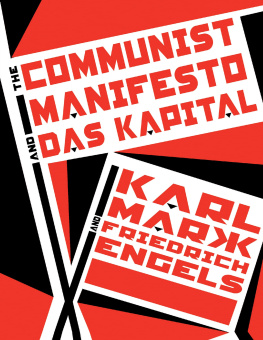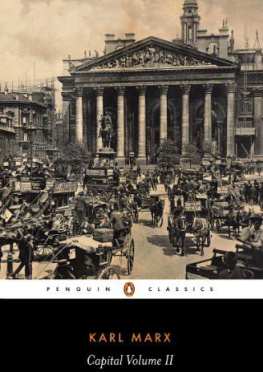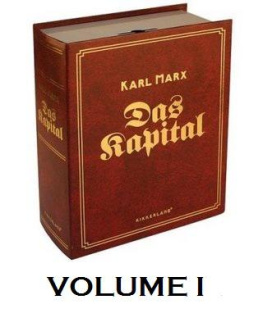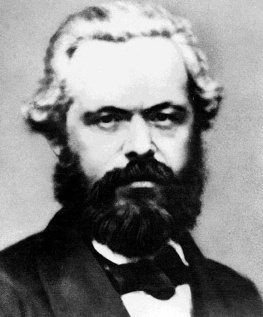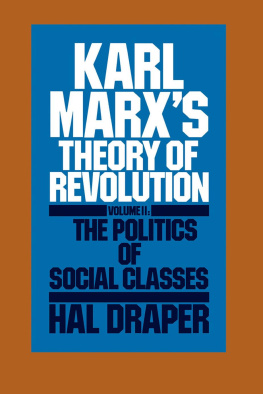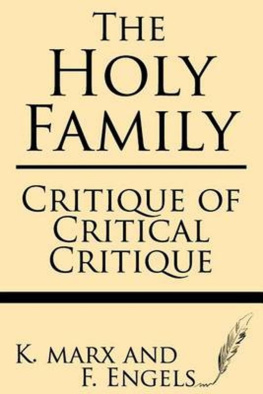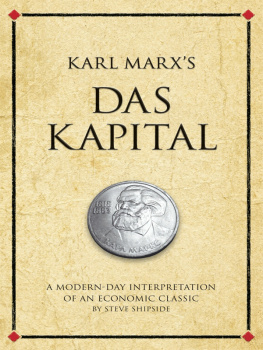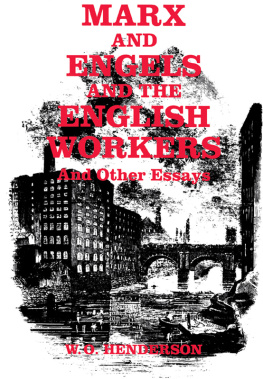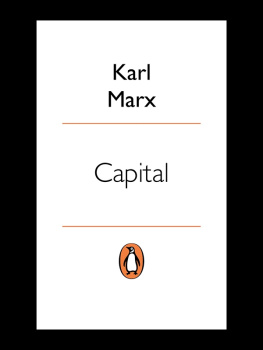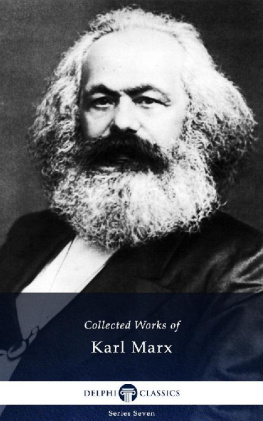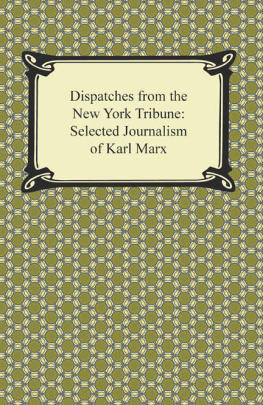I NTRODUCTION
In a caf in Paris in 1844 two young, brilliant revolutionary thinkers met, spent ten days in spirited wine-soaked debate and formed a lifelong bond. A friendship that would last 40 years. Their body of brilliant economic and philosophical writings would inspire revolutions, shake the foundations of political economy, and thereby change the course of history.
Long since buried, and in certain circles dismissed as irrelevant, we have recently been experiencing a renewed interest in Marx and Engels. Karl Marx, it seems, with his studious critique of capitalism found in the voluminous Das Kapital, along with his co-author Friedrich Engels clarion call for the revolutionizing of society in The Communist Manifesto, have returned from the grave.
The Communist Manifesto, published in 1848, is short and salty, with concepts and ideas immediately accessible. It was born in the midst of great societal upheaval. Kings and capitalists struggled to hold back the rising tide of communist political organizing. Indeed, the ruling classes saw clearly that A spectre is haunting Europe. The spectre of communism. These opening lines, this energetic claim, inspired those seeking freedom from the fetters of the bourgeoisie. It placed Capitalism in a historical context. For those living in the tumult of the day and for generations to follow, it laid out in laymans terms the battle that lay ahead, why it must be fought, and who must win. Engels conceded that Marx was the primary author, a genius and was content to play second fiddle to so splendid a first fiddle. Yet together they produced a concise pamphlet, remarkable for its grasp of the historic moment in which it was born. The Manifesto is the most widely read, if not the only work read, by many who engage with anti-capitalist revolutionary thought.
The publication of the first volume of Das Kapital in 1867, along with volumes two and three published posthumously by Engels, is another story. Unlike the Manifesto, it was not written for the general public. When trade unionist Peter Fox was handed a copy of Das Kapital he lamented I feel like a man who has just been given an elephant as a gift. One has to agree. It is an elephant. Yet, it provided an in-depth analysis of the obscure and little understood inner workings of capitalism. Das Kapital is a scientific and technical analysis, albeit with several moments of poetic satire and wit. Written for the consumption of other philosophers, theorists, and economists, and to undergird the vanguard of the party, this work is often a challenge to read. Indeed, certain passages are almost as difficult to read as Marxs famously indecipherable handwriting. Handwriting of such dreadful penmanship that it had to be transcribed by his devoted wife Jenny before any work could be sent off to the printer. The abridged version offered here is a godsend to those wanting to understand Marxs political economy on a deeper level, but are not prepared to devote years of their lives to the effort.
Today, as then, capitalism and communism stand in binary oppositions to each other. In between these polls exists a variety of political and economic expression. So why this renewed interest in the philosophy of Karl Marx? Here in the United States neoliberal economic policies have failed to meet the needs and expectations of millions of people, yet with capitalism firmly ensconced in the halls of power, Marxs closing prediction in The Communist Manifesto that the ruling classes would tremble at the inevitable rise of communism seems a naive fantasy. His warning, a hollow threat, a laughable proclamation duly placed in the ash bin of history. Neoliberal democracies, the successful winners in this historic battle of ideologies, would come to rule and dominate the planet. However, across the globe, there are challenges to the status quo coming from both ends of the political spectrum. A terrifying rise of rightwing authoritarianism, nationalism and neo-fascism, is met on the left with a resurgence of socialist organizing. The rejection of the status quo would lie in Marxs view with the economic mode of production. Just as millions lived in desperate poverty during 1800s so to today, as rampant inequality soars to ever greater heights and as then, so to now, has undue influence in the halls of political power. Marx wrote in 1864 To conquer political power has therefore become the duty of the working classes.
Marxs pointed comment in the Manifesto stating that the executive of the modern state is but a committee for managing the common affairs of the whole bourgeoisie rings true today. The inequality ever present in capitalist society was laid bare in their time, so too in ours. New challenges and question arose then and arise now: Does society have to be this way? Where can we look for alternative ways or organizing our lives and work? Marx dares to answer these questions and many more in the book you now hold in your hands.
Born on May 5th, 1818 in the West Germany city of Trier, Marx enjoyed a childhood of relative ease and economic security. His father Heinrich had converted to the Lutheran faith in order to enhance the viability of his law practice. It was not practical to be a Jew in Germany. It was assumed that Karl would follow his father in the practice of law, but he was quickly drawn to philosophy and radical politics while being educated at the Universities of Bonn and Berlin. A member of the Young Hegelians and an eager follower of Hegels famous dialectic which proposed that any existing reality, a thesis, is challenged by a competing thought, an antithesis. This tension is then resolved by a synthesis of these competing ideas. At this point, a new thesis arises which is later challenged by a new antithesis, and then a new synthesis emerges and so on ad infinitum. The state of the world order was not fixed or pre-ordained but rather was in a constant process of change. In this exciting academic environment, he became involved in left wing struggles which eventually led to his exile from Germany as well as other countries on the continent until at last he, his wife, and children landed in London in 1849 where he would live out his days. His remains rest at Highgate cemetery in London.
His life on Dean Street in the slums of the Soho neighborhood of London was one of recurring financial debt and privation. A dismal setting in which Marx saw three of his children die. Their deaths seemingly brought on by the frequent cold and damp of those two cramped rooms, along with periods of malnutrition. Scraping out a meager living was a daily battle for the young philosophers family. Without the support of Friedrich Engels the family may not have survived at all.
Friedrich Engels, like Marx, was born into a prosperous family in the Rhineland region of Western Germany. His parents were devout Christians, and his father, a successful industrialist. Displaying a remarkable gift for literature, and languages, he would later speak nine of them, his father nevertheless ended his education at the age of 17 and set him to work in the family business. Friedrich was soon to take control of his own education, eventually adopting atheism and like his good friend discovered and became a follower of Hegel. Inspired, as was Marx, by the notion that wrestling with contradictory opinions give rise to new ones. Yet, these philosophical pursuits were matched by a vigor and physical engagement with the world. At 21, Engels was both a talented horseman, and a graceful dancer, but he left his cozy existence and joined the Army in 1841. The General, as he came to be affectionately called, was delighted to be set free from his desk.

